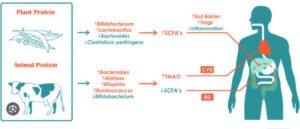
A Gut Protein Holds Promise for Treating Inflammatory Bowel Disease and Colorectal Cancer. Chronic gut inflammation can create a vicious cycle, disrupting the delicate balance between food, digestive acids, gut microbes, and the immune system.
This, in turn, fuels further inflammation and, in some cases, even cancer development. Now, researchers at the University of Wisconsin–Madison have identified a potential target for treating millions suffering from inflammatory bowel disease (IBD) and its associated colorectal cancers. Their findings, published in JCI Insight, offer hope for new therapeutic strategies.
A Key Player in Gut Health:
Led by Dr. Ting Fu, the team uncovered a hidden function of a crucial gut protein – the farnesoid X receptor (FXR). FXR, known for regulating bile acids, plays a vital role in maintaining gut health.
Together with bile acids, it helps balance gut bacteria, strengthens the intestinal lining, and guides immune cells called macrophages patrolling the digestive tract against invaders.
“When FXR malfunctions, this delicate balance crumbles,” explains Dr. Xingchen Dong, lead author and a postdoctoral researcher in Dr. Fu’s lab.

Unraveling the Inflammation Loop:
The researchers studied mice with chronic gut inflammation mimicking colitis-associated colon cancer in humans. They discovered that these mice had dysfunctional FXR, leading to disrupted bile acid signaling.
Moreover, the composition of bile acids within their digestive tracts changed, affecting both “host” (self-produced) and microbial (bacteria-metabolized) bile acids.
These altered bile acids triggered a chain reaction, altering gut macrophage behavior and causing a surge in inflammatory proteins called cytokines. This provided crucial insights into how FXR dysfunction drives inflammation, potentially leading to colitis and cancer.
“From a scientific standpoint,” Dr. Fu remarks, “it’s fascinating to see gut macrophages sensing both host and microbial bile acids, adapting their behavior and activity to different types, ultimately impacting their state and function.”
Conclusion:
This research paves the way for future treatments targeting FXR to break the inflammation cycle and potentially alleviate IBD and its associated cancer risks. A Gut Protein Holds Promise for Treating Inflammatory Bowel Disease and Colorectal Cancer.
